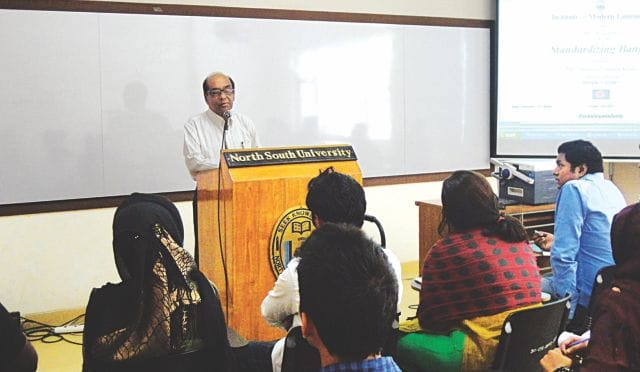Lecture on 'Standardisation of Bangla' at NSU
 Shamsuzzaman Khan presenting the discourse on Bangla. Photo: Courtesy
Shamsuzzaman Khan presenting the discourse on Bangla. Photo: Courtesy
Shamsuzzaman Khan, Director General of Bangla Academy, and former Director General of Shilpakala Academy of Bangladesh, presented a discourse on Bangla Bhasha at NSU's Institute of Modern Languages on February 27, 2013. The event was a special session of the Institute's high-profile lecture series IML Discourse I. A good number of students of NSU attended the discourse Standardising Bangla.
The objective of his lecture was to focus on the contextualisation of standardising the Bengali language as well as the importance of Bangla in our lives.
At the very outset of this lecture Shamsuzzaman Khan recalled the significance of the historic Language Movement in 1952. He said that the Language Movement was related with the national identity of Bangla-speaking people around the world.
Professor M Shahedul Haque, Head of IML at NSU, in his introductory remarks, explained the concept of codification of a language and said that standardisation of a language can preserve and protect not only the originality of a language but also the cultures associated with it. He said that while gradual transformations are natural and unstoppable in the development of a language, there is always an issue of acceptable pure form in usage, lexical preference, syntax, and grammaticality of linguistic expressions. The Bengali language was at the heart of the conflict between us and enemy Pakistan in 1952 which inspired the historical 'Language Movement' that paved the way to the independence of Bangladesh in 1971 for which millions of Bengali speakers laid down their lives. It is due to Bangla and the Language Movement of 1952, February 21 is observed as the International Mother language Day around the world. Indeed Bangla Bhasha represents our sovereignty, pride, unity and identity. Therefore, the language deserves to be linguistically codified and standardized in Bangladesh. Professor Haque highly appreciated Bangla Academy's efforts about this matter.
According to Shamsuzzaman Khan, language can be enriched not only by the language resources of itself but also those of other languages. For instance, some English words have their origin in Bangla. Similarly, in the Bengali Language a good number of words have been borrowed from different languages of the world for various reasons in different times. In this respect a lot of words from Sanskrit, Arabic, Farsi, Portuguese, Turkish, Hindi etc occupied the Bengali dictionary to a great extent.
He also pointed out that Bengali includes two basic styles: the colloquial speech known as Chalitobhasa and the formal speech known as Sadhubhasa. Differences between the two are evident primarily in terms of vocabulary and Chalitobhasa's contraction of pronouns and verbs. After the publication of Shobujpotro by the eminent figure in Bangla literature Promoth Chowdhury, Chalitobhasa has now become Bengali's leading literary language as well as its primary means of everyday communication. In addition, a number of regional dialects exist within the Bengali language. That is why the necessity of standardising Bangla rises, which was first realised by the Noble laureate Rabindranath Tagore. In 1901 in the newspaper 'Bongio Shahitto Parishad' he started the movement to standardise Bangla where he wrote that the grammar that had been used so long is the grammar that belongs to the 'Sanskrit' language and sometimes there is also the influence of Latin. Consequently, there is no purity of the Bengali Language. This movement was accompanied by Dineshchandra Sen, Haraprashad Shastri and Ramendra Shundar Tribedi but in these 110 years it is yet to be done. The reason of this failure is that the bangla used by the West Bengal Hindu community in Calcutta has similarity with their Indian language and culture; so they are not inclined to accept the Bangla that we use in Bangladesh. And, indeed, we also have differences in Chalito Bangla. So by combining the Bangla of two regions, an effort has been taken to standardise Bangla from 2009 which brought forth “Promito Bangla Bekoron” (Standard Bangla Grammar) in 2012.
(The writer is Information Assistant, Institute of Modern Languages, NSU.)

 For all latest news, follow The Daily Star's Google News channel.
For all latest news, follow The Daily Star's Google News channel. 



Comments